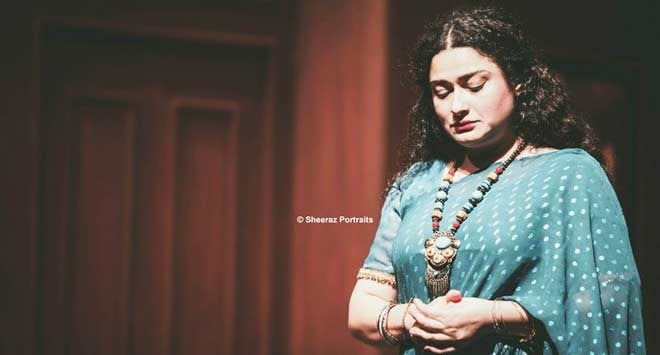
Instep gets gems of wisdom from Sania Saeed during the very successful run of her theatre play Mein Adakara Banun Gi

Some 25 years ago, a young girl named Sania Saeed made her TV debut in Sahira Kazmi’s Tapish, a student politics drama that starred such acting bigwigs as Jamal Shah, Shafi Mohammad Shah, Rubina Ashraf and Khaled Anam. Little did anyone suspect at the time that this young girl would go on to become the most sought after actress of her generation, and win countless awards and innumerable fans with her ability to dip into almost any character effortlessly. Be it the title role in Anwar Maqsood’s Sitara Aur Mehrunnisa, the young mother in Aahat, the supporting role in Zaibunnissa or the first wife in Numm, Sania has been there and done that. Even after two PTV Awards and four Lux Style Awards for Best Actress, she remains as enthusiastic about her work as ever. Instep meets the young-at-heart Sania to learn the secret behind her eternal youth and success.
The acting ‘veteran’ has been involved in theatre from a very young age. It was in the early 1980s that her father Mansoor Saeed established the non-commercial theatre troupe Dastak, which later evolved into Katha under Sania and her director husband Shahid Shafaat’s leadership in the ’90s. Their latest collaboration Mein Adakara Banun Gi (MABG) is being staged at the Karachi Arts Council with Sania in the lead along with another theatre enthusiast Abdullah Farhatullah. "Theatre is my life," Sania says with a glint in her eyes. "We don’t get time to do anything else when we are doing theatre; we have eight-hour rehearsals for a play that is hardly 90 minutes long."
Is the effort worth it, one wonders? The kind of messages that Katha aims to send should be broadcast far and wide, but theatre nowadays attracts an elitist audience. "Yes, tickets are quite expensive but that’s beyond our control," asserts Sania, "We work in adverse conditions and the cost of putting up a play can go haywire due to the unstable economy. Even then, people come to watch in droves – not only at the Arts Council, but even when we perform for an audience in old Golimaar too."
"Theatre for small audiences has been our specialty. Although we knew how to make a play, we couldn’t sell it," Sania admits, referring to the previous run of MABG in 2009. "Even then, we survived due to our strong message and our commitment to theatre. I am thankful to Kopykats Productions who decided to bring back MABG and market it properly, ensuring that it reaches more people this time."
Sania is glad that young people are coming to watch MABG, in which the works of writers like Saadat Hasan Manto and Naseem Hijazi are being discussed. "There are many, many layers to both characters, when they are talking about Manto and Naseem Hijazi, or comparing Marlon Brando to Salman Khan. Contrary to popular belief, the last four lines are not the message; the whole play is. There is a lot being said between the lines."
Speaking of young audiences, one can’t help wonder how this acting veteran has remained forever young. She credits her appreciative audience for this: "I think it’s about being around good people, in good spirits and absorbing good energy from those around you. It keeps you going, doosre log aapko zinda rakhte hain."
Although Sania Saeed may appear ageless, she seems to have slowed down in recent years. But she doesn’t agree. "I’ve always been a one-project-at-a-time person," she says, "Even in the days of Aahat and Sitara Aur Mehrunnisa, I had only one project on my plate. Due to the abundance of TV channels and serials, the visibility of my plays has lessened to some extent. Mere dramay kahin dab gaye hain."
It’s a pity that meaningful plays are eclipsed by the more commercial, flashier kind. "When TV production becomes only about the business, you lose the plot," Sania simply says.
Sania has always chosen roles that are true to life rather than the usual rich girl-poor girl roles. Hasn’t that made her unpopular in the eyes of producers who want actresses to just accept roles rather than negotiate terms? "I believe people have problems other than being rich or poor. Thankfully, producers and directors know me, so they don’t approach me for those stereotyped roles. I take pride when I get roles like the one in Aseerzadi. I want more characters written for the great women in our society. Where are all those women who are climbing mountains, flying planes, saving lives, running orphanages? They are the real women of Pakistan."
Sania has faith in the talented breed of new actresses; according to her, all they need is a little more effort. "I think Aamina (Sheikh), Sarwat (Gillani), Yumna (Zaidi) et cetera are quite good. They are better looking, more talented and know the world better than many of their predecessors. All they need to do is give time to their skills and accept roles that would cultivate their talent. They have to feed their talent."
In which genre does the talented actress feel most comfortable? "In every genre," Sania says without thinking twice. "For me, the end is most important; I don’t care if I am the protagonist, antagonist, second lead or whatever. Before accepting a role, I think to myself what people would take back home after watching the play. If I don’t agree with the story, I would say no to it. Like in Numm, I wasn’t the flag bearer but my role was very important and that’s why I agreed to do it."